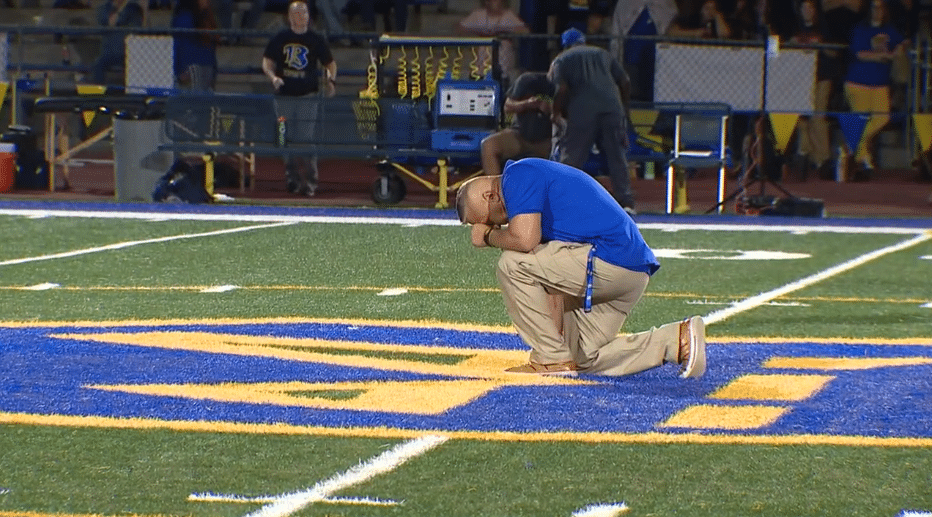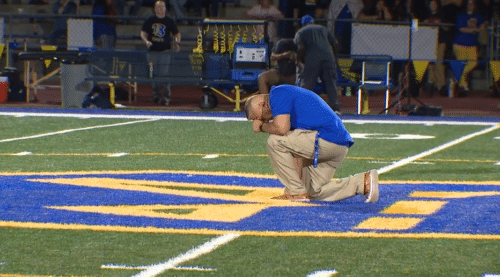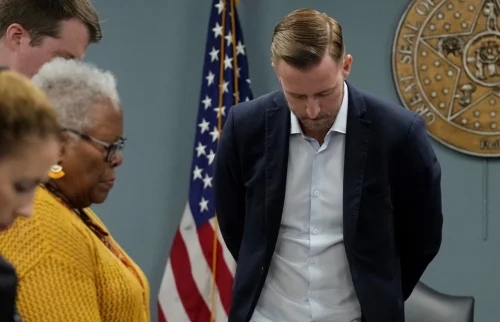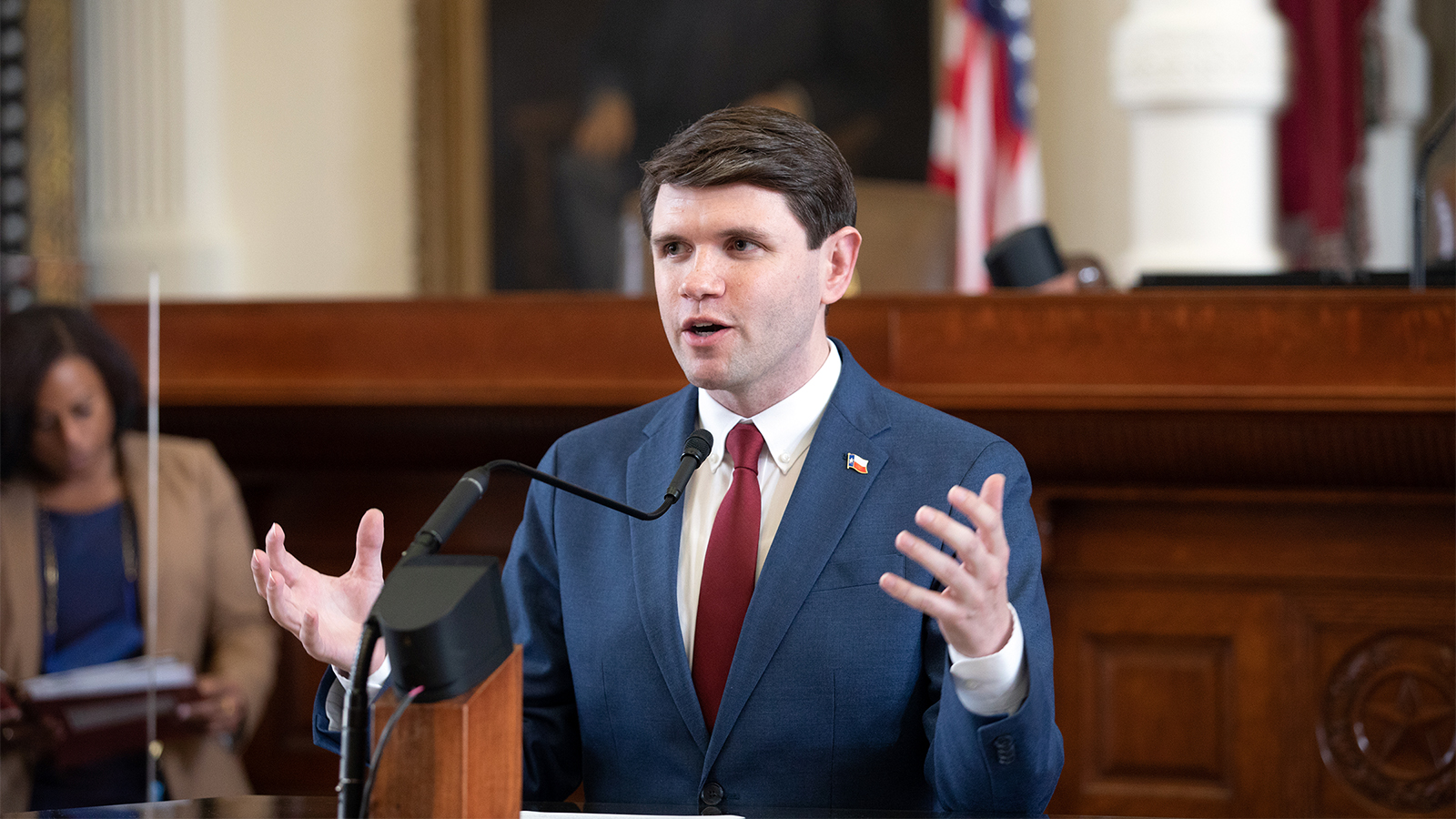
(RNS) — When Louisiana Gov. Jeff Landry was asked to defend his support for a new state law requiring public schools to display a version of the Ten Commandments in public classrooms, he made sure to touch on the bill’s obvious religious connections.

Screengrab as Bremerton High School assistant coach Joe Kennedy takes a knee and prays at the 50-yard line after Bremerton’s win over Mount Douglas in a high school football game at Bremerton Memorial Stadium in Bremerton, Wash., on Sept. 1, 2023.
“This country was founded on Judeo-Christian principles, and every time we steer away from that, we have problems in our nation,” Landry, a Catholic, said during an interview with Fox News.
But just a few days later, it was Christian clergy — along with an array of religious leaders and parents of various faiths — who filed a lawsuit against the new statute, backed by the Americans United for the Separation of Church and State, the Freedom From Religion Foundation and offices of the ACLU.
“As a minister, this law is a gross intrusion of civil authority into matters of faith,” the Rev. Jeff Sims, a Presbyterian Church (U.S.A.) minister and plaintiff in the case, said in a press conference about the lawsuit. “It interferes with the administration of God’s word, co-ops the word for the state’s own purposes, or claims God’s authority for the state.”
The back-and-forth is part of a broader fight raging across the country, with conservative state lawmakers — often backed by conservative Christians — pushing faith-focused laws and running into opposition from other religious people and their secular allies.
Over the past two years, at least 19 states have considered faith-forward legislation, including bills promoting the display or discussion of the Ten Commandments in schools and those allowing for school chaplains. Three states — Louisiana, Utah, and Arizona — have already passed Ten Commandments legislation, although Arizona’s governor vetoed the bill, and Utah’s Legislature walked back their initial proposal, with lawmakers ultimately only adding the decalogue to a list of historic documents that can be discussed in class. In addition, Louisiana recently joined two other states — Texas and Florida — that have passed laws allowing for chaplains in public school.
At least one state has achieved similar aims by circumventing the legislative process altogether. Last month, Oklahoma Superintendent of Public Education Ryan Walters issued a directive requiring schools to “incorporate the Bible, which includes the Ten Commandments, as an instructional support,” and has said teachers who fail to teach students about the Scripture could risk losing their license.
“We’re proud to be the first state to put the Bible back in school classrooms,” Walters said in an interview with News Nation.

Ryan Walters, Oklahoma Superintendent of Public Instruction (right), bows his head in prayer along with other members of the state’s Board of Education during an official meeting on April 12, 2023. Walters ordered public schools in June to incorporate the Bible into lessons for grades 5 through 12, the latest effort by conservatives to incorporate religion into classrooms. (Sue Ogrocki/Associated Press)
Religious leaders in the state were quick to push back against the directive, however, with one pastor from the more socially liberal United Church of Christ denomination posting, “Public schools are not Sunday schools,” according to KFOR. Rachel Laser, head of Americans United, told KFOR her group is mulling a legal challenge like the one they helped file in Louisiana, while Jewish leaders, Muslim leaders, and a local Methodist bishop spoke out.
“United Methodists believe that the state should not attempt to control the church, nor should the church seek to dominate the state,” UMC Bishop James Nunn told KOCO in a statement. “We endorse public policies that do not create unconstitutional entanglements between church and state.”
While there are some differences, many of the bills share common traits or even language. Most of the bills advocating for displaying the Ten Commandments use a translation of the decalogue derived from the King James Version of the Bible, a translation that is not embraced by all Christians, much less Jewish Americans or those of other faiths. In fact, the text is slightly different from the KJV and has a particular history: It is the version compiled by the Fraternal Order of Eagles used to help promote the 1956 movie “The Ten Commandments.” The same version was also used on a Ten Commandments monument that sits outside the Texas State Capitol. (Despite a legal challenge, the U.S. Supreme Court ruled in 2005 that the monument is allowed to stand because of its “passive” nature.)
Bills pushing school chaplains also share common traits, likely a byproduct of the religious groups behind them. According to The New York Times, the National Association of Christian Lawmakers — a new group formed in 2020 — worked with lawmakers in Florida, Louisiana, and Texas to pass chaplains bills. The Texas bill was also spurred by a group of activists affiliated with the National School Chaplain Association, a group run by former drug smuggling pirate Rocky Malloy.
As debate over the Texas chaplains bill heated up last year, one Democratic lawmaker in particular — Rep. James Talarico, a Presbyterian seminarian — emerged as someone who opposed the bill on both legal and religious grounds. During debate on the House floor, he expressed concerns that NSCA’s parent organization, Mission Generation, appeared to have advocated for proselytizing to children in schools.
“I see this as part of a troubling trend across the country of Christian Nationalists attempting to take over our democracy and attempting to take over my religion — both of which I find deeply offensive,” Talarico told Religion News Service in an interview last year, referring to the chaplains bill and efforts to pass a Ten Commandments bill in Texas.
Republican lawmakers did not amend the chaplains bill to bar proselytizing or impose credentialing requirements for chaplains, leaving it up to individual school districts to outline parameters themselves.
The National School Chaplain Association is referenced by name in the text of Pennsylvania’s school chaplains bill, which was introduced in April. It defines a “certified school chaplain” as “an individual certified by the National School Chaplain Association or other similar organization.” The NSCA was also mentioned in committee discussions in Nebraska.
And where the chaplains bills have become law, criticism has been a constant — especially from religious groups. In March, a coalition of religious organizations signed a letter condemning efforts to install public school chaplains as “greatly flawed” and as threatening “the well-being, education, and religious freedom of our students.” Signers of the letter included entire Christian denominations, such as the Alliance of Baptists, Cooperative Baptist Fellowship, United Church of Christ as well as other religious groups such as the Union for Reform Judaism and the Unitarian Universalist Association. Religious advocacy groups, such as the Muslim Public Affairs Council, Hindus for Human Rights, The Sikh Coalition, and Baptist Joint Committee for Religious Liberty, also signed the letter.
In Texas, as school boards across the state gathered in recent months to vote on whether to allow chaplains in their regions, faith leaders regularly appeared to voice disapproval, and more than 100 chaplains signed a petition arguing religious counselors in public classrooms would be “harmful” to students.
In their letter, chaplains decried the absence of standards or training requirements for school chaplains in the bill aside from background checks. They pointed to military chaplains or those who work in health care as a point of comparison, noting requirements like extensive training and instruction on how to work across multiple faiths — conditions absent from the Texas law.
“Because of our training and experience, we know that chaplains are not a replacement for school counselors or safety measures in our public schools, and we urge you to reject this flawed policy option: It is harmful to our public schools and the students and families they serve,” the letter reads.
Proponents of the new slate of faith-focused bills appear confident the courts will back them — especially the current conservative-leaning Supreme Court. Louisiana Gov. Jeff Landry declared at a GOP fundraiser that he “can’t wait to be sued” over the state’s Ten Commandments bill, and Walters of Oklahoma — who has accused Biden, a Catholic, of wanting to destroy “our Christian faith” — told PBS he was unconcerned about legal challenges to his Bible directive because justices appointed by Donald Trump would back him.
“If we get sued and we get challenged, we will be victorious, because the Supreme Court justices (Trump) appointed actually are originalists that look at the Constitution and not what some left-wing professor said about the Constitution,” he said.
Whether or not justices would actually support the laws is unclear. While opponents of the laws point to ample Supreme Court precedent suggesting the statutes violate the constitutional prohibition against establishing a state religion, at least two members of the Supreme Court — Justices Clarence Thomas and Neil Gorsuch — declared in a 2020 concurring opinion they believe the establishment clause only applies to the federal government, not the states. While their viewpoint is considered fringe by many scholars, it remains to be seen if others on the court, such as Justice Amy Coney Barrett, agree.
And while some of the education bills have died in committee, such as in Nebraska, others have helped spur related legislation. Lawmakers in Indiana, for instance, dropped the chaplains bill as part of a compromise legislation that allows students to leave school for religious instruction if they request it.
But religious opponents to such laws say they are prepared to combat them. In the press conference with those suing Louisiana over its Ten Commandments law, Joshua Herlands, a Jewish parent and one of the plaintiffs in the case, laid plain what he feels the debate is ultimately about.
“The displays distort the Jewish significance of the Ten Commandments in several places and send the troubling message to students — including my kids — that they may be lesser in the eyes of the government because they do not necessarily follow this particular version, or any version, for that matter, of the religious text,” Herlands said. “The state is dividing children along religious lines.”







